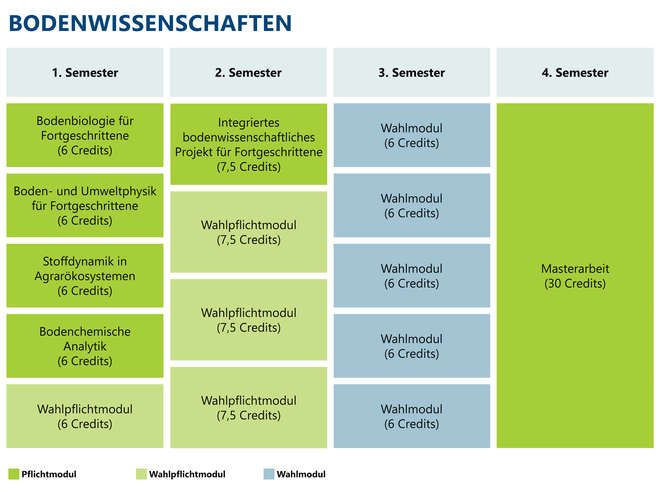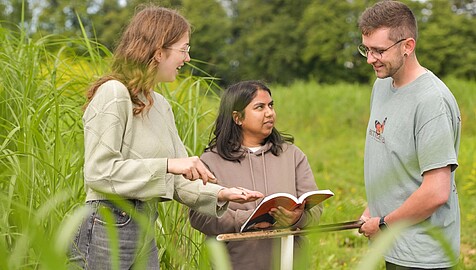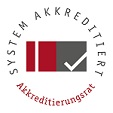Soil Sciences
Soils – the thin skin covering the Earth – are natural bodies with important functions.
Agricultural Sciences (Master’s)
Major: Soil Sciences
Soils – the thin skin covering the Earth – are natural bodies with important functions.
Soils are indispensable for the Earth's ecosystem and food production. Are you interested in researching the soil habitat and learning about its importance for the environment, climate, and agriculture? Then the major in Soil Sciences, which is only offered at Hohenheim, is the right choice for you. Learn about the diversity of soils, their locations, and properties as well as the processes that take place in soils. Analyze soils physically, biologically, and chemically, for example with regard to their properties as water and carbon reservoirs, as a filter medium, or for ensuring fertility. Evaluate soils and learn about preventive and remedial soil protection.
What you can expect:
- We will help you develop and explore the topics that are important to you.
- Specialize in our wide range of soil sciences from the microscopic to the kilometer scale.
- The range of soil science courses offered at Hohenheim is unique in Germany, both in terms of their breadth and depth.
- Learn to master modern laboratory methods
- Incorporate aspects relating to sustainability, social and economic relevance as well as the environmental and ethical consequences of agricultural sciences seamlessly into your studies in order to preserve soil resources for future generations
- Prepare for interesting and varied careers in the agricultural engineering sector, including with internships
- Reasons to choose Hohenheim
| Degree Master of Science | 4 semesters 120 Credits | Language of instruction Deutsch | German | University places unlimited | Location Stuttgart | |||||

Diversity in depth and breadth
There are 5 compulsory modules with a total of 31.5 credits in your Soil Sciences major. One of these is the integrated soil science project for advanced students, which is offered as a practice-based block lecture series. A further 28.5 credits must be earned from the module pool of 11 soil-specific semi-elective modules. If you would like to broaden your knowledge, you can additionally choose modules from the compulsory and semi-elective pool in the plant sciences and/or agricultural engineering subject areas. Ideally, you should complete the compulsory and semi-elective modules in your first year of study. You must also complete a further 30 credits in elective modules. You can choose elective modules from the entire range of Master's modules offered by the faculty, i.e. including from modules assigned to other Master's programs. If you have a special interest in topics that are not primarily agricultural, you can even choose elective modules from the degree programs offered by our neighboring faculties. If you are interested in a summer school or a stay abroad, this can be easily arranged in the 3rd semester. If you are well prepared, you should have no problem getting your credits recognized.
You would like to know more?
You can download detailed information about the course and structure of the program here:
- Module catalog for Soil Sciences
- Examination Regulations
- Academic program advisors
- Soil Sciences in Hohenheim
- Faculty of Agricultural Sciences
What you should bring with you
The Master's degree program in Agricultural Sciences with a major in Soil Sciences builds on the knowledge you have acquired in general natural sciences and environmental, agricultural, or geosciences in your Bachelor's degree program in agricultural sciences, agricultural biology, biology, forestry, or environmental sciences. If you have completed one of these Bachelor's degree programs or a related degree program, and are keen to work in the laboratory and in the field, the Master's degree program in Agricultural Sciences with a major in Soil Sciences could be just what you are looking for.
The formal requirements for the Master's program are:
- Bachelor’s degree in agricultural sciences or related subjects from a university in Germany or abroad, or from a university of applied sciences, with a standard period of study of at least 3 years (180 ECTS in total) (for further “related subjects”, see Annex 2 of the Admission Regulations).
- If your final grade or grade point average for that degree is not above average, you can submit separate evidence of your particular aptitude for the program (for details see Admission Regulations § 4).
You should have the following interests and knowledge in addition to the formal criteria:
- Interest in agricultural, geological and environmental topics
- Practical experience in agriculture/forestry and environmental protection is an advantage
- Openness to current issues such as climate action, sustainability, and transformation
- Interest in digitalization and AI
Preparing scientific results for use by practitioners
The best way to put your knowledge into practice is through an internship, which you can choose according to your interests and integrate into your studies.
Gaining practical experience
You can integrate an internship in an agricultural company or a company in an upstream or downstream sector into the degree program as part of the elective portfolio module.
Acquiring new skills
You will find additional further education opportunities on campus in the form of the F.I.T continuing education courses, the “Artificial Intelligence and Data Science in Hohenheim” (AIDAHO) certificate, or the start-up support in the “Innovation Greenhouse”.
Learning from practice
The degree program offers you numerous opportunities for practical learning. Lectures by practitioners, projects with companies, exciting excursions, and application-oriented projects during your studies give you a direct insight into professional practice and promote your ability to actively apply the knowledge you have acquired.
Strengthening language and intercultural skills
Would you like to improve your language skills? For this purpose, the Language Center at the University of Hohenheim offers various semester and intensive courses that you can take individually during your studies. You can even acquire the UniCert III C1 certificate as part of an elective module. During your studies, you will also acquire intercultural skills naturally by interacting with your fellow students from all over the world.
Researching during your studies
During your studies, you will be able to participate in scientific working groups and gain valuable insights into research practice. By actively participating in research projects, student research projects, and specialized research modules, you become part of the scientific process and acquire qualifications for independent scientific work.
Are you interested in an exchange semester? Make sure to start planning early. A stay abroad is best planned for your 3rd semester. A stay abroad may also be possible as part of your Master's thesis.
We cooperate in research and teaching with 80 partner institutions worldwide, 40 of which are in the ERASMUS program.
The University of Hohenheim’s Office of International Affairs provides extensive information and advice on stays abroad and their financing through scholarships.
What makes our degree program so special?
- Over 700 hectares of experimental fields give you plenty of practical space for your own experiments and research work.
- Nowhere else in Germany can you study agricultural engineering and soil sciences as intensively as in Hohenheim. We are unique in this respect.
- You can choose from a wide range of modules at the Hohenheim Faculty of Agriculture thanks to over 50 professorships. This allows you to get a taste of other topics (e.g. business administration, organic farming, nutrition, etc.) in addition to your individual specialization.
- We very much encourage research in national and international projects. We can therefore help you, for example, to join a large collaborative research project or collect data in projects abroad as part of your Master's thesis.
- More good reasons for studying in Hohenheim
Lydia Schumacher

I am now at:
Landesanstalt für Umwelt Baden-Württemberg
I work there as:
Soil protection officer
I benefited from the following during my studies:
“I really enjoyed specializing in soil science because of the excursions and laboratory courses. The enthusiasm of the lecturers was quickly passed on to me and I quickly became excited about the diverse and indispensable role of soil in the ecosystem. I still benefit from the exceptional education in my work in soil protection today.”
Stefan Heilek

I am now at:
Johann Heinrich von Thünen Institute in the field of agricultural climate protection
I work there as:
Research associate in the project Soil Condition Survey Agriculture
I benefited from the following during my studies:
"Due to the manageable number of students in the soil science specialization, there was very good personal support throughout the entire program. It was a family atmosphere with exciting field trips and projects and an excellent education in soil science."
Interesting and individual career prospects
The Master's degree program in Agricultural Sciences with a major in Soil Sciences will make you a specialist in soils and qualify you for tasks in practical environmental and soil protection. A scientific career is, of course, also possible.
You will have excellent opportunities in both the national and international job markets after completing your studies. Possible fields of activity include:
The following professions are open to you:
- Soil management
- Environmental analysis
- Site science
- Landscape planning
- Expert appraisals
- Research and teaching in soil sciences
- Teaching and advising
- Press and public relations
- Quality assurance
- Development cooperation
- Management or project management
Potential employers include:
- Land and water management,
- Administration of environmental agencies, ministries, and authorities,
- Universities, colleges, and educational institutions,
- Environmental consulting agencies, engineering offices,
- Institutions concerned with politics and public relations,
- Development organizations.
Topics related to agricultural sciences
- Degree program downloads
- Faculty of Agricultural Sciences
- Student Council for Agricultural Sciences
- Student Council for Agricultural Sciences’ Instagram channel: Important announcements from the Student Council for Agricultural Sciences and information about the Student Council’s activities.
- Master’s in Agricultural Sciences: Mailing list for enrolled students for communicating relevant information
| Admission type | Start of studies |
|---|---|
Without admission restrictions | Winter and summer semesters |
| Application deadlines | |
| Winter semester: 15 September (all). Applications should be preferably made by 15 July so that all enrollment formalities can be completed in time for the start of the program. Summer semester: 15 March (all). Applications should be preferably made by 15 January so that all enrollment formalities can be completed in time for the start of the program. | |
| Requirements | |
|---|---|
| Admission requirements | 1. Bachelor’s degree in agricultural sciences, biology, or related subjects from a university in Germany or abroad, or from a university of applied sciences, with a standard period of study of at least 3 years (180 ECTS in total) (for further “related subjects”, see Annex 2 of the Admission Regulations). |
| Selection procedure | |
|---|---|
| Selection criteria | None, as the number of places is not restricted
|
| It is possible to apply to a higher subject-related semester for the winter semester (application deadline: 15 September) and summer semester (application deadline: 15 March). | |
| Application process | |






